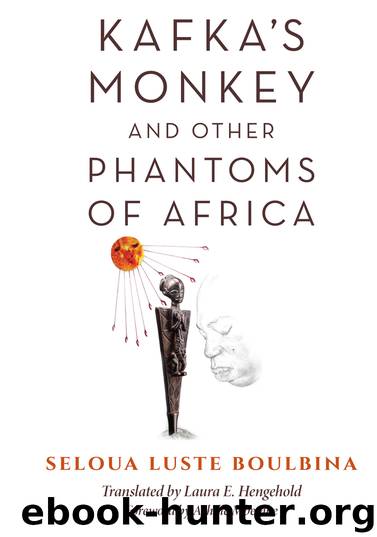Kafka's Monkey and Other Phantoms of Africa by Seloua Luste Boulbina

Author:Seloua Luste Boulbina
Language: eng
Format: epub
ISBN: 9780253041937
Publisher: Indiana University Press
Published: 2019-03-23T00:00:00+00:00
PART II
AFRICA AND ITS PHANTOMS: WRITING THE AFTERWARD
INTRODUCTION
WHILE MUSING OVER THE BEST WAY TO INTRODUCE a reflection on decolonial becoming, it seemed to me that a personal account would undoubtedly be the best kind of approach.1 People’s lived experiences, the things they carry within but also between them, are often imperceptible; all the same, this does not mean they are inaccessible. Colonial upheavals, postcolonial outcomes, and decolonial becomings are not just historical events or political phenomena. They are also disruptions or improvements in communication, in themselves and among themselves.
“It’s a land of lunatics!” This judgment was the everyday expression of coloniality. It testified to the colonizers’ ignorance and incomprehension. But there is another way to understand this outburst. Certain countries are marked by a disturbed self-understanding due to colonialism. Individuals are affected as much as societies, which often devote themselves to searching for an identity—one forever lost, given how thoroughly colonial relations were able to modify the forms in which individuals and collectives lived and perceived themselves.
As a child in Algeria, I gazed with fascination at the men without noses who had been mutilated during the war and forever after bore its stigmata. The FLN had waged war on the consumption of tobacco and had forbidden smoking and the taking of snuff. The disobedient found themselves sanctioned by the savage amputation of their lips and particularly their noses. The nif, the nose, is the very symbol of honor, and someone who has lost his nose has also lost his honor. He no longer has horma, or respectability. At that time, however, I did not understand what I was seeing, and the information available to me was neither enlightening nor comforting.
Other phenomena were also disconcerting. Ben Khedda’s house was next door to ours, but he was said to be under “house arrest.” It seemed that Ferhat Abbas could no longer be officially named. I had never known the father of one of my best friends, either. Her home, an apartment at the center of Algiers where she lived with her brother, was filled with Russian literature but also, if I remember correctly, the complete works of Kim Il Sung and many other things besides. Her father, a communist, was imprisoned somewhere in the South. Where exactly? I am not sure that anyone ever really knew.
Her father, whose first name was Nasser, had been registered by the French authorities under the family name Naceur. In French Algeria—in other words, colonial Algeria—certain people were simply saddled with new names. No one knows why the Aït Kaci Ouyahia became Yakhou. Ordinary civil servants entered certain colonized persons in their registers as SNP or “without surname” (sans nom patronymique). What could you do but give in, even if only partially or disingenuously, to the imposition of your own name?
On French soil, candidates for naturalization also had new names imposed on them—but in a different way. Thus it happened that Ezra Benveniste, who was born in Aleppo and had not yet become the great linguist that we know today, later bore the official name Émile.
Download
This site does not store any files on its server. We only index and link to content provided by other sites. Please contact the content providers to delete copyright contents if any and email us, we'll remove relevant links or contents immediately.
The remains of the day by Kazuo Ishiguro(9002)
Tools of Titans by Timothy Ferriss(8402)
Giovanni's Room by James Baldwin(7351)
The Black Swan by Nassim Nicholas Taleb(7136)
Inner Engineering: A Yogi's Guide to Joy by Sadhguru(6798)
The Way of Zen by Alan W. Watts(6619)
The Power of Now: A Guide to Spiritual Enlightenment by Eckhart Tolle(5788)
Asking the Right Questions: A Guide to Critical Thinking by M. Neil Browne & Stuart M. Keeley(5778)
The Six Wives Of Henry VIII (WOMEN IN HISTORY) by Fraser Antonia(5518)
Astrophysics for People in a Hurry by Neil DeGrasse Tyson(5193)
Housekeeping by Marilynne Robinson(4453)
12 Rules for Life by Jordan B. Peterson(4308)
Ikigai by Héctor García & Francesc Miralles(4277)
Double Down (Diary of a Wimpy Kid Book 11) by Jeff Kinney(4275)
The Ethical Slut by Janet W. Hardy(4261)
Skin in the Game by Nassim Nicholas Taleb(4255)
The Art of Happiness by The Dalai Lama(4132)
Skin in the Game: Hidden Asymmetries in Daily Life by Nassim Nicholas Taleb(4009)
Walking by Henry David Thoreau(3966)
